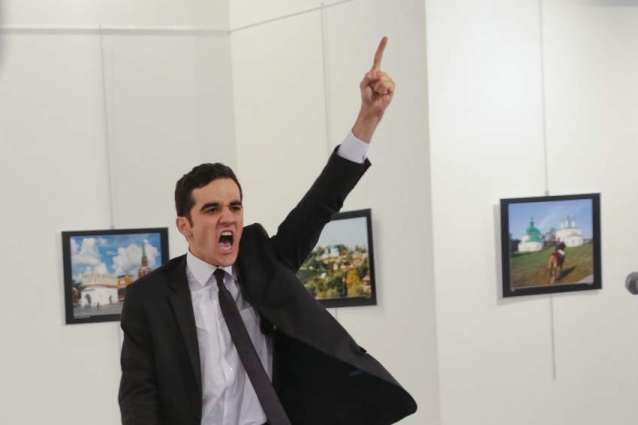Wednesday marks the second anniversary of the assassination of Russian Ambassador to Turkey Andrey Karlov by a gunman in Ankara.
MOSCOW (Pakistan Point News / Sputnik - 19th December, 2018) Wednesday marks the second anniversary of the assassination of Russian Ambassador to Turkey Andrey Karlov by a gunman in Ankara.
On December 19, 2016, the ambassador was delivering a speech at an art gallery exhibition opening in the Turkish capital of Ankara. According to eyewitnesses, a man yelled "Allahu Akbar" from behind his back and then fired several shots. The assassin allowed some people to leave the room and took another several shots at Karlov, who was lying on the floor. After the attack, the ambassador was taken to a hospital, where he died 40 minutes later. The Russian Foreign Ministry said that it considered the attack a terrorist act.
The murderer used a Canik pistol. He fired 11 shots, hitting Karlov with nine bullets, which resulted in two exit wounds, media reported.
The perpetrator came into the exhibition hall wearing a business suit and tie and was taken for a member of the diplomat's security service, eyewitnesses said. He was killed by police. Another three people were injured in the attack.
The attacker, Mevlut Mert Altintas, was born in 1994 in Turkey's Manisa province. He graduated from the police academy and worked in the security forces for two and a half years. Altintas presented his police identity card at the entrance to the exhibition hall.
The UN Security Council denounced the assassination of Karlov as an act of terror and called for the punishment of its perpetrators.
On December 19, the main department of Russia's Investigative Committee opened a criminal case under section three of Article 361 of the Russian Criminal Code (an act of international terrorism resulting in death).
On December 22, Karlov was buried in Moscow's Khimki cemetery.
Russia and Turkey launched a joint investigation into the crime immediately after the murder. The Turkish authorities declared that the murder was premeditated. They suspected that the crime was organized by Islamic cleric Fethullah Gulen, accused by Ankara of masterminding the 2016 failed coup attempt, and residing in the United States since 1999. The cleric denounced the crime as a "horrible act of terror."
Turkish police discovered that Altintas's e-mail box was hacked with a new SIM card on the day of the ambassador's murder, with all the correspondence having been deleted. This was done two and a half hours after the assassination, when Altintas was already dead. The criminal used Gmail, a service run by Google, which was asked by the Turkish authorities to assist in the investigation. The involvement of accomplices into the attack has been confirmed.
On January 7, 2017, Turkish police arrested five people as part of the investigation. Four out of the five of those detained had served in the security services together with Altintas. According to the Prosecutor's Office, the fifth detained man was an activist from Gulen's organization that allegedly sought to recruit students of the Rustu Unsal Police Academy in Izmir, where Altintas studied.
Turkish media also reported about the arrest of the organizer of the exhibition, at which Karlov was killed, and of another police officer.
On January 19, 2017, the Prosecutor's Office reportedly interrogated detained police officers. After the interrogation, one policeman was released, whereas others had to stand trial. As a result, one policeman was sent to a prison in Ankara. Others were released with travel restrictions.
In mid-February 2017, four other suspects, including two police officers, were reportedly detained.
Moreover, in March 2017, Turkish media reported that police had arrested a Russian woman, 33-year-old Yekaterina, suspected of links to the murderer. She reportedly called Altintas before the end of November and also communicated with him via the WhatsApp messenger. The woman was said to be involved in arranging escort services in Ankara's five-star hotels.
Citing a law-enforcement source, the Sabah newspaper reported in March that the Prosecutor's Office in Ankara, tasked with investigating the murder, had appealed to the US Federal Bureau of Investigation (FBI) for help.
On June 13, 2017, media reported that the Prosecutor's Office had identified five suspected contractors of the Russian ambassador's murder. All of them were staying at the hotel close to the scene of the murder and could have contacted the assassin. According to the Prosecutor's Office, one of them could have ordered the murder of Karlov. Law enforcement also established that Altintas had visited a shopping mall not far from his hotel, where he spoke to one of the suspects using FaceTime app and later met him in the hotel.
In November 2017, the Turkish Prosecutor's Office established that, during its investigation into the diplomat's murder, the murderer's Gmail inbox was hacked from a student dormitory in the Turkish Republic of Northern Cyprus. The prosecutors hope that messages could still be recovered and are trying to unblock Altintas's telephone for this purpose. The Prosecutor's Office asked the Apple company for help but after its refusal sought help from a Turkish company.
On November 24, 2017, Turkish media reported that Turkish journalist and tv producer Hayreddin Aydinbas was arrested on suspicion of involvement in Karlov's murder. He was brought to Ankara and interrogated by the prosecutor, who is running the investigation into the assassination. The court later ruled to arrest Aydinbas.
In November 2018, Turkish media reported that Karlov's assassination had been prepared since summer 2016 by followers of Gulen. The investigation into the murder has been reportedly completed with 28 suspects facing charges of the crime.
According to the NTV broadcaster, the trial on the case will kick off on January 8, 2019.




